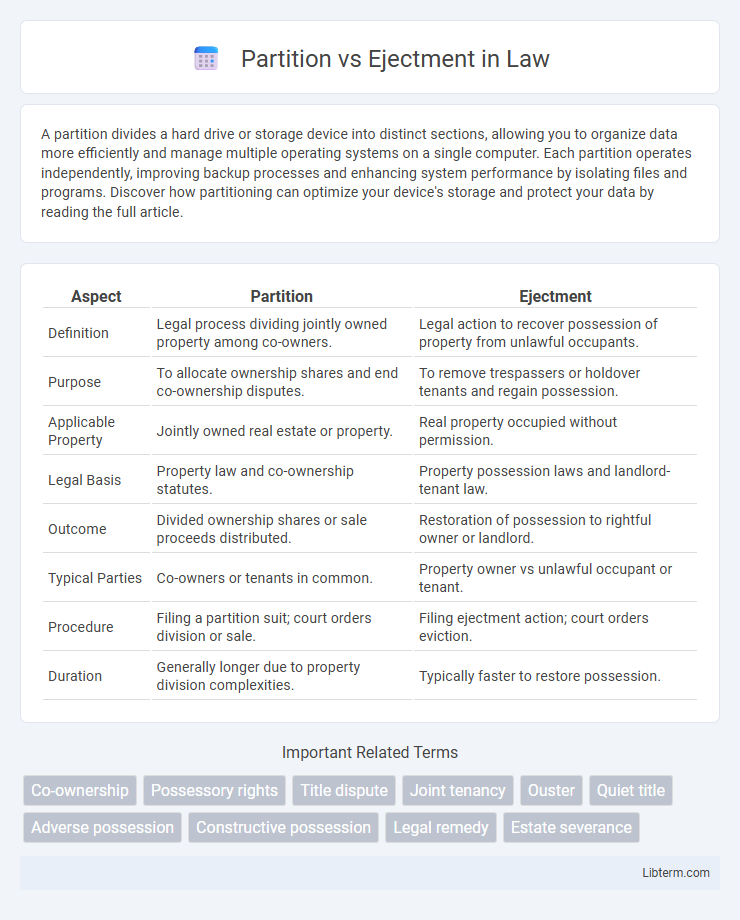A partition divides a hard drive or storage device into distinct sections, allowing you to organize data more efficiently and manage multiple operating systems on a single computer. Each partition operates independently, improving backup processes and enhancing system performance by isolating files and programs. Discover how partitioning can optimize your device's storage and protect your data by reading the full article.
Table of Comparison
| Aspect | Partition | Ejectment |
|---|---|---|
| Definition | Legal process dividing jointly owned property among co-owners. | Legal action to recover possession of property from unlawful occupants. |
| Purpose | To allocate ownership shares and end co-ownership disputes. | To remove trespassers or holdover tenants and regain possession. |
| Applicable Property | Jointly owned real estate or property. | Real property occupied without permission. |
| Legal Basis | Property law and co-ownership statutes. | Property possession laws and landlord-tenant law. |
| Outcome | Divided ownership shares or sale proceeds distributed. | Restoration of possession to rightful owner or landlord. |
| Typical Parties | Co-owners or tenants in common. | Property owner vs unlawful occupant or tenant. |
| Procedure | Filing a partition suit; court orders division or sale. | Filing ejectment action; court orders eviction. |
| Duration | Generally longer due to property division complexities. | Typically faster to restore possession. |
Introduction to Partition and Ejectment
Partition and ejectment are distinct legal remedies addressing property disputes. Partition involves dividing jointly owned property among co-owners, allowing each party to obtain a specific portion or sell the property to distribute proceeds. Ejectment is a legal action used to recover possession of real property wrongfully occupied by another party, focusing on removing unauthorized tenants or trespassers.
Definition of Partition
Partition is a legal process used to divide property among co-owners so each party obtains a distinct portion, effectively ending joint ownership. It can involve physical division of land or sale of the property with proceeds distributed according to ownership shares. Unlike ejectment, which seeks to remove an unlawful occupant, partition specifically addresses the interests and rights of co-owners in shared property.
Definition of Ejectment
Ejectment is a legal action used to recover possession of real property wrongfully withheld by another party. It specifically addresses disputes where the plaintiff seeks to oust the defendant from land or premises unlawfully occupied, often involving claims of title or right to possession. Unlike partition, which divides ownership interests among co-owners, ejectment focuses solely on regaining possession from an unauthorized occupant.
Legal Grounds for Partition
Legal grounds for partition primarily involve situations where co-owners of real property seek to divide their interests to terminate joint ownership, often arising from disputes among heirs, tenants in common, or joint tenants. Partition actions are typically based on property co-ownership, requiring proof of undivided interests, whereas ejectment actions focus on wrongful possession or eviction disputes, involving parties who do not have lawful possession. Courts grant partition to ensure equitable division or sale of property, emphasizing the legal rights of co-owners rather than possession claims.
Legal Grounds for Ejectment
Ejectment is a legal action used to recover possession of real property from someone unlawfully occupying it, typically relying on proof of ownership or right to possession. The primary legal grounds for ejectment include trespass, breach of a lease agreement, or unlawful detainer where the occupant lacks any legal claim or permission to hold the property. Unlike partition, which involves dividing shared property among co-owners, ejectment strictly addresses wrongful possession and the right to exclude trespassers or unauthorized occupants.
Key Differences Between Partition and Ejectment
Partition involves dividing jointly owned property among co-owners, either physically or by sale with proceeds distributed, while ejectment addresses wrongful possession by one party and seeks their removal from property. Partition suits scenarios where co-owners want to dissolve shared ownership, whereas ejectment is used to recover possession from someone unlawfully occupying the land. The key difference lies in partition resolving ownership interests, and ejectment enforcing rightful possession.
Procedural Steps in Partition Actions
Partition actions require filing a complaint that identifies co-owners and property details, followed by serving summons to all parties involved. Courts typically order a property appraisal and may appoint a referee to oversee the division process. The final step involves either a physical division of the property or a judicial sale, with proceeds distributed among owners according to their shares.
Procedural Steps in Ejectment Actions
Ejectment actions begin with filing a complaint that identifies wrongful possession and requests the court to restore possession to the rightful owner or lessee. The plaintiff must prove a possessory interest by presenting evidence, often including title documents and proof of the defendant's unlawful occupation. After establishing these elements, the court issues a judgment for possession, which can lead to a writ of possession allowing law enforcement to remove the unlawful occupant.
Remedies and Outcomes in Partition vs. Ejectment
Partition remedies involve dividing property among co-owners, either physically or by sale, ensuring equitable ownership shares are recognized and enforced through court orders. Ejectment remedies focus on the removal of unlawful occupants, securing possession for the rightful owner through eviction and damages for trespass. Outcomes in partition typically result in either co-owners obtaining individual titles or sale proceeds, whereas ejectment results in restoring possession and potential compensation for wrongful exclusion.
Choosing the Right Legal Action: Partition or Ejectment
Choosing between partition and ejectment relies on the specific property dispute context: partition suits are ideal for co-owners seeking to divide or sell jointly owned property, facilitating a fair distribution of assets. Ejectment actions target unauthorized occupants or trespassers, aiming to remove them and restore possession to the rightful owner. Understanding the distinction between partition's focus on property division and ejectment's emphasis on possession enforcement ensures selecting the appropriate legal remedy for effective resolution.
Partition Infographic

 libterm.com
libterm.com